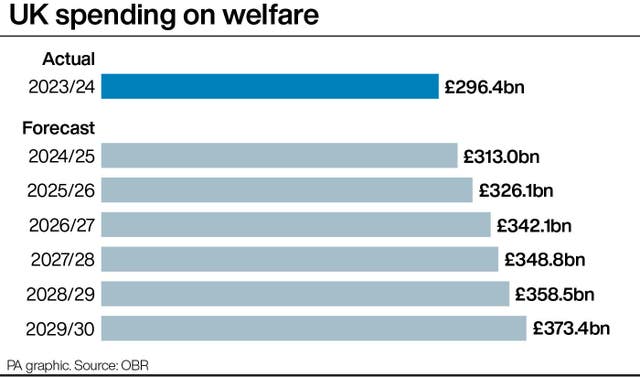Labour seats set to suffer worst economic impact of welfare reforms – study
MPs have been urged to consider the wider impact of changes to eligibility requirements for the personal independence payment.

Limiting access to financial support for people with debilitating conditions will cause the most economic harm in poorer communities, with the worst-affected constituencies represented by Labour MPs, a study has found.
A seat-by-seat analysis of the potential consequences of the Government’s plan to tighten the eligibility criteria for the personal independence payment (Pip) showed businesses in some places face collective annual losses of more than £20 million.
The study, which examined the drop in spending locally as a result of fewer Pip claimants being eligible under the changes, also found that the most deprived areas stand to lose nearly three times more than the wealthiest.

The latest data shows there are 3.7 million people receiving Pip in England and Wales. The level of financial support provided is based on how high claimants score based on their level of difficulty performing day-to-day activities.
Changes to Pip assessments are part of a push to reduce the welfare bill and get more people into employment.
The “pathways to work” Green Paper, published in March, includes a plan to require a minimum score of four points in at least one category to qualify for the “daily living” component of Pip.
The age at which young people transition from disability living allowance for children will also be increased from 16 to 18.
The research by Health Equity North, led by academics from Newcastle University, the University of Sheffield and the University of Manchester, found the changes would have the most impact in the North East and the North West, with average per person losses of £269 and £231 respectively.
These regions are followed by Yorkshire and the Humber (£206), the West Midlands (£191) and the East Midlands (£185).
At constituency level, the worst hit are Easington in County Durham (£409 per person), Liverpool Walton (£403) and Knowsley (£389).
The analysis showed these losses to economies could total between £23.4 million and £26.2 million every year by 2029/30, with the most deprived constituencies losing an annual £265 per person compared to £96 in the least deprived.
The 10 worst-hit constituencies are all represented by Labour MPs in so-called “red wall” areas. The remaining seven are Bootle; Blackpool South; Birkenhead; Hartlepool; Houghton & Sunderland South; Liverpool West, Derby; and Wallasey.
The lowest economic impacts were identified in in Bristol Central (£62 per working-age person), Oxford and West Abingdon (£66) and Wimbledon (£67), equating to £5 million, £4.7 million and £4.9 million per year respectively.
The research also found the Pip reforms would disproportionately affect areas with the lowest levels of life expectancy in England.
The Green Paper says fewer than one in five Pip claimants are in employment and people in receipt of the support are “less likely to leave the benefit now than when it was first introduced”.
“This is having a significant drag on living standards and is a major driver of poverty,” it adds.
A Department for Work and Pensions (DWP) impact assessment of the changes to social security in the spring statement estimated there will be an additional 250,000 people, including 50,000 children, in relative poverty by 2030.
The assessment states that this estimate does not include the impact of funding to support people into work, “which we expect to mitigate the poverty impact”.
Clare Bambra, academic co-director of Health Equity North and professor of public health at Newcastle University, said Parliament should not “rush through” the Government’s plans without considering the wider impact.
She added: “Those areas that will lose most from this proposal were already decimated by austerity, Covid and the cost-of-living crisis.
“They have worse health than other regions and their local services and economies are already struggling.
“Losses of this magnitude risk worsening the situation for everyone living in these deprived constituencies.”
Luke Munford, also a director of Health Equity North and a senior lecturer in Health Economics, at the University of Manchester, said: “While we acknowledge the Government’s desire to reduce costs and encourage people into work, we urge MPs to consider the potential impact of this proposal to thousands of people in their constituencies before casting their vote.”
The conclusions of the study were based on figures provided in response to freedom of information requests and publicly available data from the DWP and the Office for National Statistics.
A DWP spokesperson said: “As part of our Plan For Change, we’re creating a sustainable welfare system that delivers proper support to help sick and disabled people break down barriers, unlock work, boost living standards, and grow the economy.
“This is on top of our Get Britain Working White Paper, which set out the biggest employment reforms in a generation – backed by £240 million – working across government and with our mayors, local leaders, the NHS, and employers to drive up employment and opportunity and grow the economy.”





